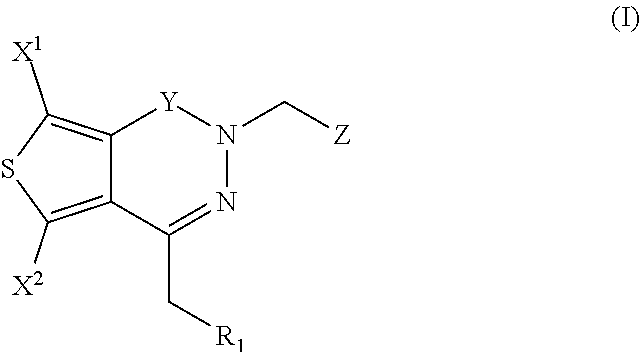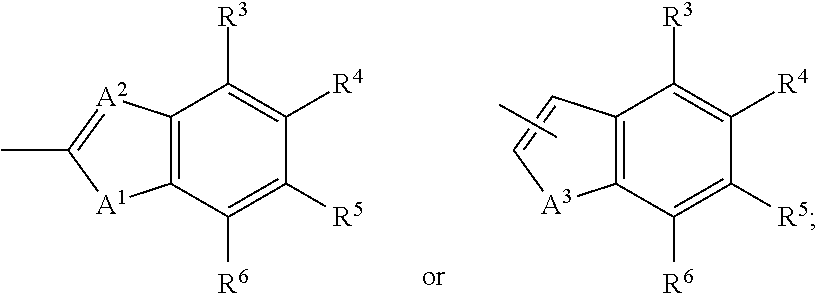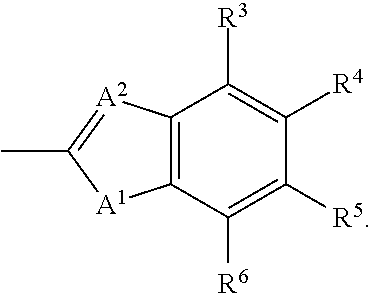Aldose reductase inhibitors and methods of use thereof
a reductase inhibitor and aldose technology, applied in the field of compound and pharmaceutical composition, can solve the problems of swelling and potential damage, overabundance of sorbitol in the cells, and inability to easily diffuse,
- Summary
- Abstract
- Description
- Claims
- Application Information
AI Technical Summary
Problems solved by technology
Method used
Image
Examples
example 1
on of Compound VII
[0405]Compound VII was prepared as schematically illustrated below.
[0406]
2-(chloromethyl)-5-(trifluoromethyl)benzo[d]thiazole (Compound I-S)
[0407]Compound I-S was prepared using the same method described previously in U.S. Pat. No. 8,916,563.
4,6-dichloro-1H,3H-thieno[3,4-c]furan-1,3-dione (Compound II)
[0408]Compound II was prepared using the same method described previous in Ayres, B. E., Longworth, S. W., McOmie, J. F. W. Tetrahedron, 1975, 31, 1755-1760.
2,5-dichloro-4-(methoxycarbonyl)thiophene-3-carboxylic Acid (Compound III)
[0409]A solution of 0.495 g (2.22 mmol) of 4,6-dichloro-1H,3H-thieno[3,4-c]furan-1,3-dione (Compound II) in 4.0 mL of MeOH was treated with TFA (1 drop) and heated to 65° C. overnight. The reaction mixture was cooled to ambient temperature and concentrated in vacuo. To the obtained residue was added ether followed by saturated aqueous NaHCO3. The layers were separated and the aqueous layer was extracted with ether (1×). The aqueous layer was...
example 2
on of Compound XII
[0414]Compound XII was prepared as schematically illustrated below.
[0415]
4-(methoxycarbonyl)thiophene-3-carboxylic Acid (Compound VIII)
[0416]Compound VIII was prepared using the same method described previous in Hawker, D. D., Silverman, R. B. Bioorg. Med. Chem., 2012, 20, 5763-5773.
Methyl 4-(3-(tert-butoxy)-3-oxopropanoyl)thiophene-3-carboxylate (Compound IX)
[0417]In a first flask, a solution of 5.27 g (28.31 mmol) of Compound VIII in 35 mL of NMP was treated slowly with 5.28 g (32.55 mmol) of CDI. The reaction mixture was stirred at ambient temperature for 2 hours. In a separate second flask, to a solution of 5.67 g (35.39 mmol) of mono-tert-butyl malonate in 50 mL of NMP cooled to 0° C. was added 3.37 g (35.39 mmol) of MgCl2. After stirring at 0° C. for 5 minutes, 14.8 mL (84.93 mmol) of N,N-diisopropylamine was added and the resulting reaction mixture stirred at ambient temperature for 2 hours. After 2 hours, the content of flask #1 was added to flask #2 and th...
example 3
on of Compound XIII
[0421]
[0422]Compound XIII, shown above, was prepared as follows: The preparation described for Compound XI was repeated except that 2-(bromomethyl)-5-fluorobenzo[d]thiazole was the reagent employed in place of Compound I-S using the same molar proportions as before. In this case, the final product obtained was tert-butyl 2-(3-((5-fluorobenzo[d]thiazol-2-yl)methyl)-4-oxo-3,4-dihydrothieno[3,4-d]pyridazin-1-yl)acetate (Compound XIII) that was carried on crude after filtering over a plug of silica washing with 2:1 (v / v) hexanes:ethyl acetate
PUM
| Property | Measurement | Unit |
|---|---|---|
| temperatures | aaaaa | aaaaa |
| temperatures | aaaaa | aaaaa |
| temperatures | aaaaa | aaaaa |
Abstract
Description
Claims
Application Information
 Login to View More
Login to View More - R&D
- Intellectual Property
- Life Sciences
- Materials
- Tech Scout
- Unparalleled Data Quality
- Higher Quality Content
- 60% Fewer Hallucinations
Browse by: Latest US Patents, China's latest patents, Technical Efficacy Thesaurus, Application Domain, Technology Topic, Popular Technical Reports.
© 2025 PatSnap. All rights reserved.Legal|Privacy policy|Modern Slavery Act Transparency Statement|Sitemap|About US| Contact US: help@patsnap.com



